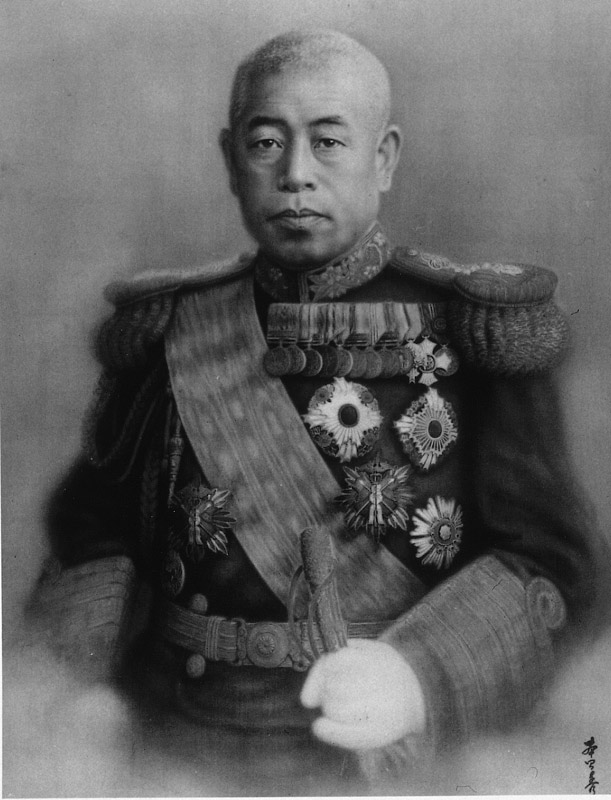ACT ONE, SCENE THREE
(Yamamoto country house, a warm central room with plants. It is late afternoon. There is a table with a vase of yellow chrysanthemums on it and two benches for seats. The room has the traditional open hearth, over which a teakettle is suspended. There are several windows revealing the snow-covered limbs of pines. Yamamoto removes his cap and sword and offers them to Reiko to put away but she refuses.)
 Reiko: Hang them up yourself, thank you. (He sighs, and hangs them up uncomplainingly. Reiko turns up a small lamp.) I’ve never seen so many gloomy days in a row. This winter just hangs on and on.
Reiko: Hang them up yourself, thank you. (He sighs, and hangs them up uncomplainingly. Reiko turns up a small lamp.) I’ve never seen so many gloomy days in a row. This winter just hangs on and on.
Yamamoto: So, were you pleased with the speech?
Reiko: Pleased, with all those reporters present? When Tokyo reads what you told those children, (sputters) the Army, the secret societies, they’ll- (beat)
Yamamoto: Want to silence me?
Reiko: Kill you, you mean.
Yamamoto: (Chuckles) There’s a joke among the ensigns: “If the Admiral offers you a ride in his limousine, don’t accept.”
Reiko: That’s no joke, is it?
Yamamoto: Idle talk, that’s all.
Reiko: Ha! So why has the Admiralty set up a machine gun on the lawn outside headquarters? You’ve had quite a few death threats, haven’t you?
Yamamoto: I assure you, they’re nothing.
Reiko: You assure me?
Yamamoto: My solemn word: empty threats.
Reiko: My beloved husband, you are one truly accomplished liar!
Yamamoto: What else would you expect of a man after a lifetime in the military?
Reiko: (She laughs at him and removes a rectangular box from a cupboard and hands it to him.) A man I never saw before dropped this off. He said only you should open it. He tipped his hat and was gone.
Yamamoto: But — see here — someone has opened my package.
Reiko: Of course. Under the circumstances, I thought I should.
Yamamoto: What circumstances?
Reiko: Well, let’s see now: the shape of the box, for one, the kind that might hold silverware. The light weight of it, and then there’s the suspicious rattling sound when you shake it. (She rattles the box in front of him.) Can’t you guess what’s in it? (Yamamoto takes the box and rattles it gingerly but does not open it.) Go on, open it!
Yamamoto: I assure you–
Reiko: What are your assurances worth? You assured the Americans bombing their gunboat on the Yangtze was an accident. You knew all along it was deliberate. And you also know what’s in the box, so open it! I guess it, and you know what’s in it, too.
(Yamamoto: opens the box and withdraws a silver dagger.)
Yamamoto: Hey, what a beauty! I saw silver like this in Mexico once. Look at this exquisite craftsmanship! A fine present! I wonder which of my friends sent it.
Reiko: Not exactly a present, my esteemed husband.
Yamamoto: Oh? (Reiko reaches into her pocket and produces a note.)
Reiko: This note was inside. (She reads.)”Cowardly dog! Do your country a service: use it.” Some friend, eh? (Yamamoto: takes note, reads with a chuckle, and crumples it.)
Yamamoto: They’re too late. I’ve already had the hara-kiri experience.
Reiko: What are you prattling about?
Yamamoto: You know that scar on my belly?
Reiko: You told me that was surgical, from a burst appendix.
Yamamoto: What I didn’t tell you is that to know what hara-kiri feels like I asked them to operate without anesthesia. (Beat) That damned Navy surgeon sure made it feel like suicide!
Reiko: I have never liked the way you gamble with your life. Any more gifts like this and I’ll open a museum. I don’t suppose it’s occurred to you to resign your commission before the war breaks out. You’ve already given the Navy thirty-five years of your life.
Yamamoto: And a couple of fingers in battle.
Reiko: (She picks box up off the table and slams it back down, sputtering) How- how many of these cowards who, who, they haven’t got the guts to sign their name to a death threat, have done what you’ve done for Japan? The risks…the fighting…the long hours?
Yamamoto: Maybe it is time to retire and read the books my forefathers wrote. Imagine, to sit in a tavern and play flower cards all day.
Reiko: (Pinching his cheeks, suddenly affectionate.) Ah, my country bumpkin, if only I could believe you meant it!
Yamamoto: Why shouldn’t I prefer the sweet life? I’m no different from the man on the street who just wants a full rice bowl… to relax at home on the sofa reading the papers. The shop girls in Tokyo don’t want the Army to take their men. They want to have a good time after work.
Reiko: (Taking down two cups.) You should know, shouldn’t you? Anyway, I was proud to be your wife today. You spoke truthfully.
Yamamoto: (Cautiously) I hope that warm feeling will carry over to tonight.
Reiko: (To audience) Listen to him! (Salutes) I will do my wifely duty, sir.
Yamamoto: Duty without emotion is drudgery.
Reiko: What do you expect of me? You drop in for a weekend every now and then and you expect passion from me as though I don’t know where you’re sleeping all the other nights. Your children don’t recognize you any more.
Yamamoto: My work is very demanding. The Navy must be ready.
Reiko: (Derisively.) Oh, sure: you sailors need to practice your cruising.
Yamamoto: My work demands long hours.
Reiko: Like those famous poker games that go on for two days and nights? That’s working?
Yamamoto: I play with other military men. More than poker is involved.
Reiko: I’ll bet! With plenty of geishas, too. A bunch of admirals pokering a deck full of queens.
Yamamoto: Japanese men will be men. That’s historic.
Reiko: Yes, but some of them come home to their wives once in a while. (She takes a seat on the same bench he is sitting on, but at the opposite end.)
Yamamoto: Reiko, I go with other officers to geisha houses for social reasons.
Reiko: Are you telling me you don’t keep a mistress? It’s the talk of Tokyo. You’re not an ensign any more. Since you’ve become a public figure, people gossip about everything you do. How can I face the women here in town?
Yamamoto: (Sharply.) Any one of them would be proud to have me for a husband.
Reiko: Ashamed, you mean. It’s your geisha who is proud to have you for her lover. You’re a walking advertisement for her bordello.
Yamamoto: It’s a respectable geisha house.
Reiko: (Laughs) Sure, for respectable philanderers wearing respectable medals.
Yamamoto: (Sadly) Our love bed has grown cold.
Reiko: But that Yoko is hot stuff, eh? Oh, I know her name. I’ll bet she’s passionate in bed. All right, tonight I’ll wriggle and scream for you, like a bought and paid for concubine.
Yamamoto: Maybe if we took a walk after dinner in the snow in the woods.
Reiko: (Handing him his tea, then pouring her own cup, and shaking her head with amusement.) What’s up? In all the years we’ve been married you haven’t once taken me for a walk in the moonlight. You can’t be desperate. What do you want from me?
Yamamoto: I’d like…perhaps we could become close again, lovers…
Reiko: Let me tell you about real love. (Yamamoto starts to interrupt but Reiko cuts him off.) Can you listen for just once? My parents loved each other. They were always touching and kissing. They made love in the dairy, and the bathhouse. They always found ways to delight each other. And you, Mister Grand Admiral, you don’t know the difference between love and need. You think you can drop in and take me for a walk or what-have-you to make up for my years of loneliness? (Reiko rises in a fury that has an element of good humor.) I could have given you so much. I could give you so much now, yet you dump me for a Tokyo flapper. (Reiko shimmies.) I’ve heard all about her! All the latest foreign fads, dances, and styles. Paris! New York! The Riviera! She knows them all.
Yamamoto: You know gossips exaggerate.
Reiko: (Laughs good-naturedly.) What do you take me for? At that conference in London you agreed not to build as many ships as the British, and all along you know the Navy is building these two monster battlethings in secret. Akio himself is in charge of it. How could you not know? I am not going to swallow your denials like some cub reporter. I’ve always seen right through you, (contemptuously, sitting down next to him and stabbing his chest with her index finger) my dear, philandering bumpkin!
Yamamoto: When faced with a grave threat to our national security, a nation has the right to stretch the truth to protect ourselves!
(Reiko: laughs. Yamamoto turns red in the face but keeps himself under control. Reiko laughs harder, and points to him.)
Reiko: What a liar!!
(Yamamoto: begins to laugh, too. Now they are both laughing. Reiko shakes her head. Yamamoto turns his palms up in a gesture of helplessness. Reiko: turns up her face. They kiss.)
Reiko: Come on! Lay me on the floor!
Blackout
ACT ONE, SCENE FOUR
Setting: Upstairs room in a geisha house, overlooking Tokyo harbor.
(At rise: Samisen and flute music to establish mood. Soft light illuminates Yoko who is seated facing the audience, making up her face as though looking into a mirror. She is a woman in her late Thirties who retained her youthful allure. She works on her eyebrows, applying various pencils. Her long lustrous black hair spills down her back. She wears undergarments only. On a clothes rack in the sparsely furnished bedroom hangs her ceremonial kimono. Along the back wall, paper panels begin to glow, signifying the sun rising behind them. There is a large sleeping mat on the floor at the far right, several wooden pillows and stuffed feather pillows, and a space heater. Yoko: begins to hum a popular love song, “China Night.” Tokuko enters smiling from the left and bows. Tokuko is a slender and attractive woman in her early Twenties. She has just come in from the street and wears street dress. She carries a mesh shopping bag with various food parcels that she holds up for Yoko to see.)
Tokuko: Mistress Yoko, see here!
Yoko: Ah, success!
Tokuko:I found pork chops!
Yoko:Well, the Army has got to leave something for the civilians.
Tokuko:(Lifting large salmon out of mesh bag.) And salmon, sea urchin, shrimp for the rice cakes, pickled eel.
(Yoko kisses Tokuko’s cheek and flicks her tongue over the salmon, at which they both laugh. Tokuko replaces salmon.)
Yoko:We must have everything ready tonight, precisely at eight. I want the dried sardines served with the whisky, three-colored dumplings and seafood custard.
Tokuko:The Admiral’s favorite.
Yoko:Who told you who is coming?
Tokuko:You were singing when I came in. I assumed-
Yoko:You heard the wind. Now do my hair, in the new style.
Tokuko:(Abashed) Yes, mistress. (Tokuko sets bag down on floor and coming up behind Yoko lifts her long hair up and piles it upon her head, working on it with silver combs. They face the audience, Yoko seated, Tokuko standing behind her.)
Yoko:The Admiral is bringing his boyhood friend, Akio. He was an Admiral, too, but now retired.
Tokuko:Should I be excited?
Yoko:Of course. You will be his dinner companion and, afterwards, if it comes to that.
Tokuko:Ah, how long…retired?
Yoko:(Laughs) You mean how old is he? He resigned in mid-career. He runs a shipyard.
Tokuko:Not so bad. I might enjoy going down in a submarine.
Yoko:Hush! They will speak freely. You may hear them discuss people in high places. And you will remember nothing.
Tokuko:Nothing! (Yoko senses that Tokuko is troubled as she pauses in her work on Yoko’s hair.)
Yoko:Does that bother you? What is it?
Tokuko: Uh, it’s just that, I didn’t know if to tell you–
Yoko:Yes?
Tokuko:Well, at the butcher shop just now, old Soemu said two men asked questions about you.
Yoko:(Struggling for control.) Kempetai men?
Tokuko:They asked when you make a special party.
Yoko:(Attempts to laugh it off.) Why? I am certainly not going to invite them!
Tokuko:They wanted to know when you entertain the Admiral.
Yoko:So that’s how you guessed!
Tokuko:Oh, I said nothing about that.
Yoko:Of course you didn’t. But you know what times are like. The Kempetai has a million ears.
Tokuko:Very bad people.
Yoko:What do you know about it?
Tokuko:I knew a schoolgirl arrested for what she said in class. They kept her in jail three days, then pushed her out of a car in front of her house. No one knows what they did to her because she never spoke to anyone again. She stares and hums children’s songs.
Yoko:Ah, we don’t know all the circumstances.
Tokuko:A schoolgirl, what could she have done? They punished her for words.
Yoko:Ai! Let’s try to have a pleasant evening tonight! (Tokuko holds up mirror so Yoko can see back of her head.) Good! Now hand me the photo album and I’ll show you our guests.
(Tokuko picks up album from small table and gives it to Yoko, taking a seat next to her. The women, now both seated, face the audience. Yoko holds the album, flips it open.)
That’s your dinner companion, Admiral Matsushita, (smiles, relishing the word) retired.
Tokuko:A regular Clark Gable! I wouldn’t mind retiring with him!
Yoko:Until that China business, he was only gray around the temples. His hair turned silver overnight.
Tokuko:Very manly.
Yoko:And this is the three of us in happier days, before China.
Tokuko:Yamamoto looks the same today.
Yoko:They ice-skated on the river with no proper coats and got sick and wrote each other letters from bed. As he grew older, Isoroku exercised until he became a star athlete. And his thighs, you should feel his thighs, they’re like steel –
Tokuko:(Laughs) Steel? Like Superman? Oo-o-h! O-o-o-o-h!
Yoko:(Slaps Tokuko’s hand playfully.)Yes, in every way. When he was forty in charge of the naval air station, he put himself in their marathon and ran second. (Tokuko nods.) They are both self-made men, both proud — yet very different in temperament and outlook.
Tokuko:Akio has a kindly face.
Yoko:As far as our Army is concerned, too kindly. Since he was forced out, he, ah, drinks a bit too much, you understand? He hates the Army, especially General Tojo.
Tokuko:It’s so awful, mistress. My sister’s boy comes home from school chanting, ‘Stinka Chinka! Stinka Chinka!’ And when she tells him no, he says, ‘Teacher makes us say it!’
Yoko:China is no apple orchard. We had a major back from Nanking who woke the whole house up screaming at night. They made him tie Chinese men to stakes and bayonet them.
Tokuku
Oo-ugh! I don’t want to hear about it.
Yoko:It’s true — so our Army doctors could practice operating on belly wounds.
Tokuko:They say many boxes of ashes coming home from China.
Yoko:(Yoko shakes her head. Beat) Come on, now. Help me into my kimono. (Tokuko helps her. Close and intimate, Yoko kisses Tokuko on the cheek.) I’m so glad you’re with us. (Tokuko puts the album back in its place.) Am I not still beautiful?
Tokuko:(Smiles) You know you don’t have to ask.
Yoko:Please, sit here by me. Some days, I miss Isoroku terribly. His letters are so full of passion. (She produces a letter.) This came yesterday. See here, he calls me “my sister and sweetheart” and he says, “I want to be of help to you and to relieve your loneliness. As a man I feel ashamed for letting you down. This makes me still more miserable and I want to cry weakly on your bosom.”
Tokuko:Perhaps it would be better to recall the sweet times you had with him.
Yoko:When he was a rising star I used to bring him his favorite exotic cheeses in his office in the Admiralty nights. After they made him captain of an aircraft carrier his visits became fewer and fewer.
Tokuko:Perhaps what they say about sailors is true: a woman in every port.
Yoko:Oh, I used to think that. He kept a little black book and one night while he slept —
Tokuko:You read it?
Yoko:I just opened it a little, you know?
Tokuko:And?
Yoko:Not one woman’s name. He recorded the names of all the pilots killed in training, and the dates and places where they crashed. One night at sea, a whole squadron from his carrier got lost in the fog. Drowned to the last man. They say he cried on the bridge like a baby. Afterwards, he ordered them to make instruments to fly at night.
Tokuko:Life changes so quickly. One day I was a peasant girl. A year later…
Yoko:I hear so little from him now. I fear I am falling out of his heart. (Yoko hugs Tokuko. There is something more than a motherly embrace to this and Tokuko breaks it off and walks to the window.)
Tokuko:Yoko, comes quick! Those are the same two men I saw before and I think they are watching the house. (Yoko hurries to the window.) I nodded pleasantly to them but they gave me such — I don’t know — a terrible look!
Yoko:(Collecting herself.) I fancy they are cold. Take them a pot of hot tea and cups with my compliments. (Tokuko nods and leaves. Yoko, wringing her hands and facing audience) Ai! What is Japan coming to?
BLACKOUT
ACT ONE, SCENE FIVE
Setting: Guest room in Residence of Japan’s Prime Minister.
(At rise: A floor lamp lights up revealing figure of Prime Minister’s brother-in-law seated in an easy chair reading a book. He is dressed in slacks and long-sleeve shirt. There is the sound of footsteps as Assassin, twenty-five, in a drab army uniform, bursts in with a pistol. He wears a Hitler-style moustache. Colonel Matsui stands up in shock. Assassin locks the door behind him. )
Assassin:So, Mister Prime Minister, I’ve found you!
Major Matsui:I’m not the Prime Minister! Who told you that?
Assassin:(Pulls a newspaper photo out of his pocket and compares it to the Colonel.) I have your picture.
Major Matsui:That can’t be me! (Squares his shoulders and draws himself up ramrod stiff, as though at attention.) I am Major Noburo Matsui, the Prime Minister’s brother-in-law! Say, how dare you come in here without taking off your shoes?
Assassin:My shoes? Prepare yourself for death, you dog!
Major Matsui:Idiot! I tell you, I am Colonel Matsui! I am home on leave. I have just been fighting our country’s enemies in China! Who the hell are you? What is your unit? Your uniform is improper! I’ll have you court-martialed! (Assassin:’s hand holding pistol is trembling.)
Assassin:You’re just trying to save your skin. You’re the fancy-pants diplomat who is selling us out to the foreign imperialists.
Major Matsui:Fancy what? I bought these pants on sale! I don’t know any imperialists!
Assassin:I will allow you a moment to pray.
Major Matsui:I’m a Major. I can have you executed you for this insult.
Assassin:We of the Cherry Blossom Society are prepared to give our lives. May we fall like petals to the earth, for the glory of Japan.
Major Matsui:Who are you people to judge your betters?
Assassin:I am the future. And you stand in the way of progress. (There is pounding on the door.)
Major Matsui:I am not the Prime Minister. I am not-
(Assassin: fires once and the Colonel falls back, dead.)
Assassin:Sweet dreams! (Colonel’s wife rushes in, robe flying, screaming, rushing past the Assassin. She bends over her husband’s body, touches him, lifts her hands covered with blood, and screams.)
Major’s Wife
Mur-der-er! Murder-er! (She shakes her husband, as though trying to bring him back to life.) Noburo! Don’t go! Don’t leave me, Noboru! Help! Somebody, help!
Assassin:Japan needs a Prime Minister with courage to take what is rightfully ours in Asia!
Major’s Wife
He’s not the Prime Minister. You shot my husband.
(Wife collapses over her husband’s body. After a moment, she freezes. We cannot hear the woman sobbing. Assassin steps forward and faces audience.)
Assassin:Well, it does appear I’ve made a slight error. But you can’t cook salmon without killing fish. I’ll get the Prime Minister yet. At this moment my comrades of the Imperial Way are taking over Tokyo. We control the Diet, police headquarters, and many offices. We have four Army divisions with us. Just one sign from the Emperor and we’ll kill all these traitors. The nerve of him to ask me to take off my shoes! We mean to use these hob-nailed boots of ours to kick certain countries out of the Pacific! (Confidentially.) If you think this is a Hitler moustache, you are right. We in Japan will do in the Orient what Hitler is doing in Europe. We young officers have a tradition of ritual purification by blood. We will cleanse our heavenly islands of these weaklings and put our kind in their places. (Beat) I’ve killed my first man and let me tell you, there’s really nothing to it. The Army will prevail. When a member of the Diet stood up and asked the War Minister how much he is spending on China, the Minister told him, “Shut up!” (Laughs) and the man cringed. He cringed! (Laughs hysterically.) From now on, that’s what I’m going to tell all civilians: “SHUT UP!” I say “Heil!” I say, “Seig Heil!”
(Wife’s sobs become audible again. Assassin make Hitler salute.)
Assassin:Madam, please excuse me for any annoyance I have caused you. (The Assassin bows to her, backing toward the door.) By the way, you wouldn’t happen to know where I might find your brother just now?
Colonel’s Wife
(Picks up a paper weight and hurls it at him as he exits.) A-i! (Assassin exits hurriedly.)
Blackout

Sherwood Ross is an award-winning reporter. He served in the U.S Air Force where he contributed to his base newspaper. He later worked for The Miami Herald and Chicago Daily News. He contributed a weekly column on working for a major wire service. He is also an editorial and book publicist. He currently resides in Florida.
ATTENTION READERS
We See The World From All Sides and Want YOU To Be Fully InformedIn fact, intentional disinformation is a disgraceful scourge in media today. So to assuage any possible errant incorrect information posted herein, we strongly encourage you to seek corroboration from other non-VT sources before forming an educated opinion.
About VT - Policies & Disclosures - Comment Policy



